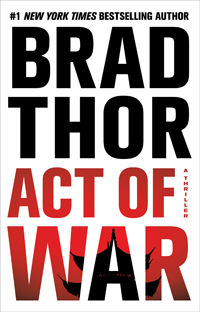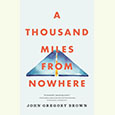Defending the Homeland—Harvath Style
Brad Thor’s latest thriller pits his super-agent against a Chinese plot to destroy the U.S.
The world is truly a dangerous place, and this simple fact has provided ample fodder to a host of conspiracy theorists and novelists alike. From Ian Fleming to Tom Clancy, from the Cold War to the War on Terror, the spy who saves the Western world from evildoers has become a treasured staple of fiction. Among bestselling authors of thrillers, one of the biggest names is Brad Thor, the newest member of Nashville’s literary community. With Act of War, Thor has proven once again why he is a favorite of the genre—and of American political conservatives.
 Act of War is the thirteenth novel featuring former Navy SEAL and current undercover operative Scot Harvath, a super-agent who believes in taking the fight to the bad guys without waiting from them to strike first. “As far as Harvath was concerned,” writes Thor, “America and its allies couldn’t kill these people fast enough.” Despite the violent rhetoric, Thor never portrays Harvath as a simple killing machine. He’s an intelligent, dedicated character—a steroid-inflated John Wayne rather than the Terminator—who relies more on threats to kill than on actual killing, though his adversaries have good reason to believe his threats.
Act of War is the thirteenth novel featuring former Navy SEAL and current undercover operative Scot Harvath, a super-agent who believes in taking the fight to the bad guys without waiting from them to strike first. “As far as Harvath was concerned,” writes Thor, “America and its allies couldn’t kill these people fast enough.” Despite the violent rhetoric, Thor never portrays Harvath as a simple killing machine. He’s an intelligent, dedicated character—a steroid-inflated John Wayne rather than the Terminator—who relies more on threats to kill than on actual killing, though his adversaries have good reason to believe his threats.
In Act of War, to make the legal and ethical aspects of torture less problematic, Thor has created a fictional menace that is not a mere criminal plot or even a 9/11-style terrorist attack: it’s a full-on attempt by China to destroy the United States. In real life, there are serious scholars who believe that a Sino-American war is almost inevitable, and both George W. Bush and Barack Obama have taken steps to avoid such a tragedy. But how would China launch a surprise attack on a technologically superior opponent?
Thor has given this question a lot of thought in his role as a member of the Analytic Red Cell Program, a group working within the Department of Homeland Security to devise possible means of attacking the U.S. so that planners can guard against even the most outrageous plots. In Act of War, Thor combines both plausible and implausible scenarios—based on America’s ever-growing debt and a long-feared nuclear side-effect—into a model of unconditional warfare that would give China absolute dominion over North America. Unless, of course, Harvath and his colleagues can stop them.
 Whipsawing from Pakistan to the United Arab Emirates, from Beijing to North Korea, and from Washington to Nashville (yes, Thor highlights his newly adopted city in his latest creation), Act of War is a suspenseful ride through the world of terrorism, both state-sponsored and not. Whether portraying the horrors of a North Korean slave camp or the mind games of “enhanced” interrogation techniques, Thor keeps the action fast, furious, and full of the technical details his readers have come to love. When the ticking doomsday clock demands that Harvath get to land from an aircraft carrier, for example, a fighter jet awaits: “The almost $70 million aircraft had a range of over twelve hundred nautical miles, a top speed of 1,190 miles per hour, and best of all for Harvath—a second seat.”
Whipsawing from Pakistan to the United Arab Emirates, from Beijing to North Korea, and from Washington to Nashville (yes, Thor highlights his newly adopted city in his latest creation), Act of War is a suspenseful ride through the world of terrorism, both state-sponsored and not. Whether portraying the horrors of a North Korean slave camp or the mind games of “enhanced” interrogation techniques, Thor keeps the action fast, furious, and full of the technical details his readers have come to love. When the ticking doomsday clock demands that Harvath get to land from an aircraft carrier, for example, a fighter jet awaits: “The almost $70 million aircraft had a range of over twelve hundred nautical miles, a top speed of 1,190 miles per hour, and best of all for Harvath—a second seat.”
Thor clearly believes in education via entertainment. Riding along with Harvath through firefight and rescue, readers learn about not only weapons and tactics but also the fears and hopes of those who share Thor’s political views. Uncompromising and blunt, from a presidential briefing about the dangers of class warfare and constant deficit spending to the internal thoughts of an ex-SEAL and constant warrior, Thor lays it out as he sees it. The president’s orders in Act of War neatly sum up the warrior’s view: “Harvath’s instructions had been perfectly clear—do whatever needed to be done to neutralize the threat. And that’s exactly what he would do.”
While the methods portrayed by Thor represent only one view of how to address threats to the homeland, they should provoke significant thought. There are very real, serious issues here, not the least of which is the question of how far a free people should be willing to go to protect their own freedom—and lives. It’s a question as old as the republic, and the fictional exploits of Scot Harvath are an entertaining primer to one side of the debate.

A Michigan native, Chris Scott is an unrepentant Yankee who arrived in Nashville more than twenty years ago and has gradually adapted to Southern ways. He is a geologist by profession and an historian by avocation.


